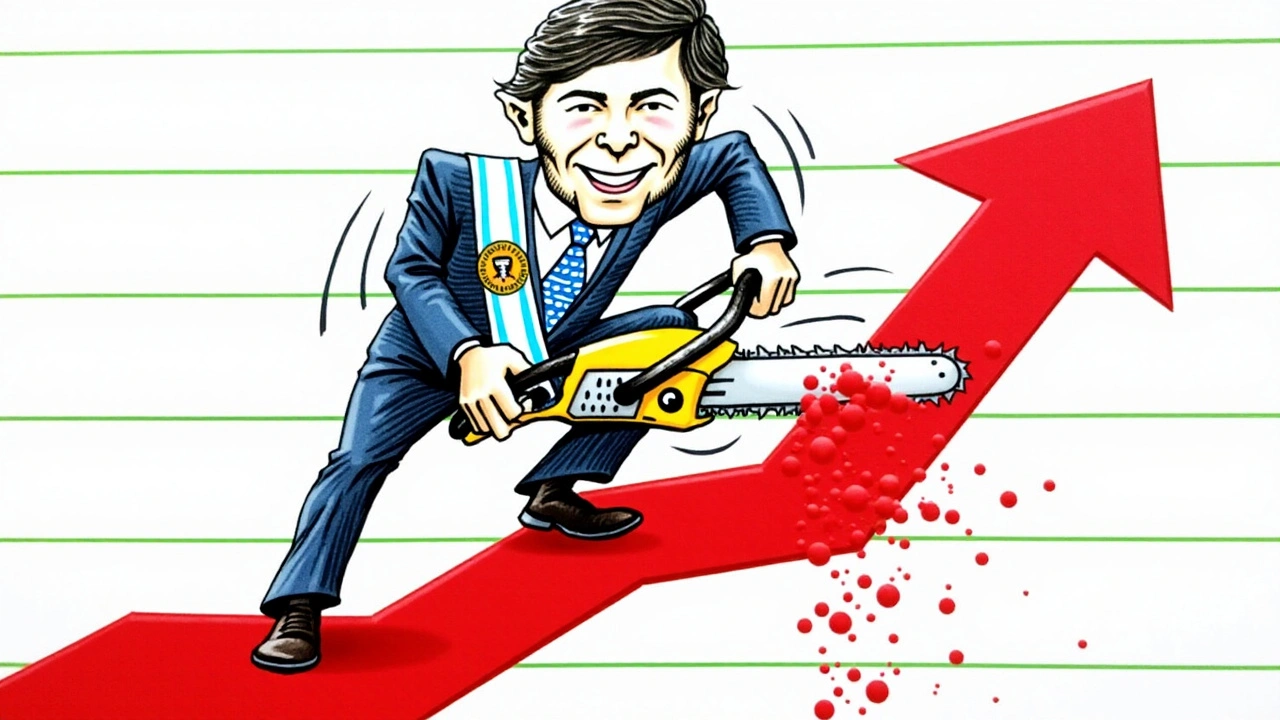Argentina's Economic Strain Under President Milei
Argentina has long been recognized for its dynamic middle class, a demographic that has historically displayed significant upward social mobility within Latin America. However, the picture has drastically changed under President Javier Milei's administration, a time marked by stringent austerity measures, economic uncertainty, and rapidly declining public approval ratings. Milei, who came into power on promises of economic revival and financial discipline, now finds himself grappling with a nationwide criticism as his policies appear to have exacerbated rather than alleviated the economic crisis.
Milei's Plummeting Approval Ratings
Recent polls underscore President Milei's sagging approval ratings, a sentiment echoed by a population that increasingly sees his economic policies as punitive rather than restorative. The stringent measures, intended to rein in the financial instability, have inadvertently placed a burden on the once-thriving middle class. Families across the nation, burdened with rising costs of living, are being forced to trim their budgets, often at the expense of essential goods and services such as education and healthcare.
In a country where inflation has spiraled to a dizzying 270%, and the Peso devaluation exceeds 50%, households find their purchasing power dwindling by a significant margin—a fifth in many cases. The economic environment grows more hostile by the day, manifesting in alarming poverty rates. Over 52.9% of the Argentine population now live below the poverty threshold, indicative of the broader systemic failures that Felipe Milei's strategies have yet to address.
Impact of Austerity on Domestic Life
The middle class that once epitomized the backbone of Argentine society now appears fragmented, symbolic of a greater national regression. Historian Ezequiel Adamovsky has likened this decline to the ruins of a shipwreck—a powerful analogy demonstrating the uneven distribution and the hollowing out of the middle-class populace.
Milei's fiscal policies, notably the cuts in subsidies for vital services such as transportation, fuel, and energy, have compounded the hardships faced by ordinary citizens. While these measures aim to fix long-term economic woes, the immediate consequence is heightened financial pressure, leaving individuals scrounging for even the most basic necessities.
The Struggles of the Agricultural Sector
The ripple effects of the crisis are widespread—stretching into Argentina's pivotal agricultural sector, which is left in a precarious state. Dominating 20% of the nation's GDP, the agriculture sector remains hopeful yet wary of the government's ability to fulfill its promise of removing export taxes and rejuvenating the industry. These commitments, while publicly lauded, have yet to see any substantial action, frustrating a workforce reliant on fair and consistent economic policies for survival.
Consequently, the sector finds its competitiveness in the doldrums, with conflicting fiscal strategies stifling export potential. This stagnancy in policy implementation is causing rifts not only among policy-makers but also among the rural populace, making the progressive overhaul of such systems appear as mere lip service.

Decline in Domestic Consumption
One of the most striking exhibits of domestic economic distress is the sharp drop in beef consumption—an emblematic symbol of Argentine cultural and culinary tradition—now at record lows. With income streams strained by high inflation and inadequate governmental support, both impoverished and ostensibly middle-class families find themselves grappling with an economically hostile environment.
Ordinary Argentines' patience wanes with each passing day as the bleak economic reality deviates starkly from Milei's initial promises of growth and recovery. Instead, the current climate is characterized by austerity's oppressive grip, challenging the capacity and resolve of a nation's populace to endure continued hardship.
Conclusion: A Tipping Point for Leadership
In summary, Argentina under current leadership is reaching a critical juncture—one that finds Javier Milei's administration in jeopardy as approval ratings continue to fall. The economic trials persistently castigate the lower and middle classes, questioning the capacity to recover under existing policies. As Argentina stands at this economic crossroads, the call for a reevaluation of governmental strategies resonates louder, begging for decisive action to rescue the country's flagging fortunes.

Traci Walther
October 12, 2024 AT 13:29Argentina's middle class is feeling the squeeze, but we can lift each other up! 🎉💪✨ Let’s support local businesses, share resources, and stay hopeful!!!
Ricardo Smalley
October 13, 2024 AT 17:15So the government cuts subsidies and expects everyone to be happy? Yeah, that’s totally realistic. It’s like trying to fix a leaky roof with a paper towel-funny, but utterly useless.
Sarah Lunn
October 14, 2024 AT 21:02Enough is enough. The middle class is not a disposable experiment for Mile‑Mile’s grand‑standing fiscal fantasies. Inflation at 270% is not just a number; it is a daily nightmare that forces families to choose between medicine and a single loaf of bread. Cutting subsidies was a reckless move that ignored the basic needs of the populace. The government claims “discipline,” but the only discipline observed is the discipline of citizens to survive on scraps. Prices of essential goods have skyrocketed, leaving a generation of youths with no future prospects. Public services are crumbling under the weight of budget cuts, and the education system is drowning in debt. Meanwhile, politicians parade in opulent offices, insulated from the very crisis they perpetuate. It’s a betrayal of trust that cannot be ignored. The agricultural sector, once the backbone of the economy, is now shackled by indecisive policy and half‑hearted promises. Export taxes remain a looming threat, choking the lifeblood of rural communities. The government’s rhetoric about “growth” is nothing but smoke and mirrors. Citizens are forced to scrap their savings, sell personal belongings, and take on debt just to keep a roof over their heads. The social fabric is tearing, and the nation is heading toward irreversible damage. If Milei’s administration does not reverse course, we will witness a full‑blown humanitarian crisis. The time for complacent optimism has passed; urgent, decisive action is required now.
Gary Henderson
October 16, 2024 AT 00:49Seeing beef prices drop like this is a clear sign of how deep the trouble goes. When a staple of culture becomes a luxury, you know the economy is in serious trouble. The government needs to rethink those austerity cuts before more families are pushed over the edge.
Julius Brodkorb
October 17, 2024 AT 04:35Policies that hurt the middle class are simply unsustainable.
Juliana Kamya
October 18, 2024 AT 08:22Let’s break down the fiscal strategy: slashing subsidies without a robust safety net equals a market shockwave. The knock‑on effect hits not just urban shoppers but also the agro‑export pipeline. If we rally as a community-consulting econ‑experts, sharing data, and pushing for transparent policy-there’s still a chance to mitigate the fallout. Stay informed, stay vocal, and keep the conversation constructive.
Erica Hemhauser
October 19, 2024 AT 12:09The government’s negligence is morally indefensible. Cutting essential services shows a blatant disregard for human dignity. This is not policy, it’s oppression.
Hailey Wengle
October 20, 2024 AT 15:55Wake up, people!!! The elite are using these “austerity” measures to funnel wealth into shadow accounts!!! Inflation is a weapon, devaluation a smokescreen-don’t let them rewrite the narrative of our nation!!!
Maxine Gaa
October 21, 2024 AT 19:42From a philosophical standpoint, the crisis invites us to question the very contract between state and citizen. When governance fails to safeguard basic welfare, the legitimacy of authority erodes. Reflecting on historic precedents, societies that ignored such warnings slipped into prolonged instability. It is imperative that we, as a collective conscience, demand policies rooted in equity and resilience.
Katie Osborne
October 22, 2024 AT 23:29It is evident that the current fiscal adjustments lack proportionality. While cost‑containment is necessary, it must not compromise essential public services. A balanced approach, incorporating stakeholder consultation, would better serve the national interest.
Kelvin Miller
October 24, 2024 AT 03:15The data clearly shows a spike in poverty rates following subsidy cuts. To address this, targeted relief programs should be implemented immediately, ensuring that vulnerable populations receive assistance without delay.
Sheri Engstrom
October 25, 2024 AT 07:02The narrative being pushed by the Milei administration is a textbook example of disinformation. By cherry‑picking economic indicators, they create an illusion of progress while the reality is a systematic erosion of living standards. Their rhetoric about "discipline" masks a deep‑seated agenda to dismantle social safety nets in favor of privatization. Moreover, the abrupt removal of subsidies triggers hyperinflation, which then justifies further authoritarian controls. This feedback loop is designed to concentrate power in the hands of a few, while the majority suffer. It is crucial to recognize the pattern: crisis creation, panic implementation, and eventual capitulation of the populace. Historical parallels can be drawn to other regimes that have employed similar tactics to silence dissent and restructure economies for elite gain. The agricultural sector’s stagnation is not an accidental side effect; it is a deliberate strategy to weaken a key source of export revenue, thus increasing dependence on foreign capital. As consumers see their purchasing power decay, they become more malleable, accepting draconian measures they would have previously rejected. The moral calculus of this governance model is fundamentally flawed; it prioritizes short‑term fiscal metrics over human dignity. Immediate and coordinated opposition is required, leveraging both domestic protests and international pressure to halt this trajectory.
Prudhvi Raj
October 26, 2024 AT 10:49Support local farms and look for community aid programs; they can help buffer the price surge.